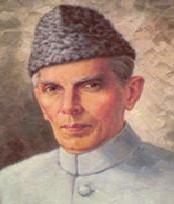Who's Who
"The story of Pakistan, its struggle and its achievement,
is the story of great human ideals, struggling to survive in the face of odds and difficulties..."
Quaid-e-Azam Muhammad Ali Jinnah (Chittagong, 26th March, 1948)
Politician and the founder of Pakistan
Poet, philosopher and political leader
More detail:
Allama Iqbal
Allama Iqbal Cyber Library
Street Named in Iqbal's honour in Heidelberg, Germany.
Mohammamd Iqbal (Wikipedia)
Dr. Iqbal Society of North America
Allama Iqbal Rare Blog & Images
Allama Iqbal Urdu Cyber Library Network
Iqbal Ka Pakistan Videos Urdu

Few individuals significantly alter the course of history. Fewer still modify the map of the world. Hardly anyone can be credited with creating a nation-state. Mohammad Ali Jinnah did all three.'
Stanley Wolpert
Professor of history
University of California, Los Angeles
& author of Jinnah of Pakistan and Nehru: A Tryst with Destiny.

To me he (Iqbal) was a personal friend, philosopher and guide and as such the main source of my inspiration and spiritual support.
Mohammad Ali Jinnah April 21, 1938

 Pakistan proud of her youth, particulalrly the students, who are nation builders of tomorrow. They must fully eqiup themselves by discipline , education, and training for arduous task lying ahead of them.
Pakistan proud of her youth, particulalrly the students, who are nation builders of tomorrow. They must fully eqiup themselves by discipline , education, and training for arduous task lying ahead of them.
Muhammad Ali Jinnah said:
"You are Free, Free to go to your temples, you are free to go to your mosques or to any other places of worship in this state of Pakistan. You may belong to any religion or caste or creed that has nothing to do with the business of state".
"I particularly appeal to our students to come forward and rise to the occasion. You have performed wonders in the past. You are still capable of repeating the history. You are not lacking in the great qualities and virtues in comparison with the other nations. Only you have to be fully conscious of that fact and to act with courage, faith and unity."
Message to Pakistan Day,
issued from Delhi March 23, 1943
"Our object should be peace within, and peace without. We want to live peacefully and maintain cordial friendly relations with our immediate neighbours and with the world at large."
Lahore August 15th, 1947


